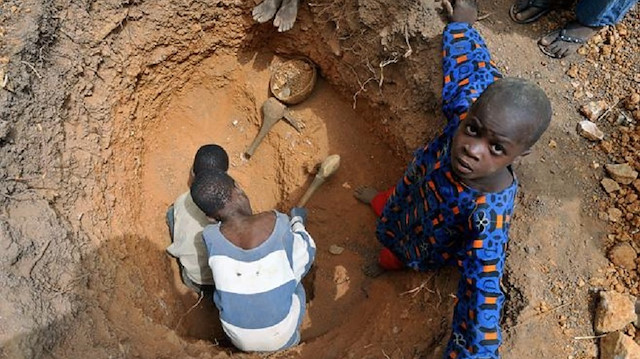
In a county in western Kenya, the gold trade is luring children to a bustling mining town where child labor is common, with children as young as eight working deep inside the hard earth in search of gold.
Even as World Day Against Child Labor falls on Wednesday, children in the town of Migori dive deep into hundreds of tunnels lacking light, air, and warmth, the walls damp and musty, covered in moss and darkened by years of abuse. Only their footsteps can be heard echoing off the tunnel walls.
Armed with pickaxes, they carry sand and rocks in basins from the mines in the hope of finding precious gold flakes and nuggets. Some basins are very heavy, forcing children to grind them along the dirt tunnel floors into an opening to start the sorting process.
Looking from above, one can see dozens of children adding water to basins in search of gold. These children rarely see the inside of a classroom, as they spend most of their days here, and in fact their parents, guardians, and the wider community supports their difficult labor.
“We’re very poor, we need money from wherever we can get it,” Mary Nseme from the nearby village of Nyatika told Anadolu Agency.
“We know children aren’t supposed to work, but without them, we can’t eat, as most of us are old.”
As June 12 marks World Day Against Child Labor, the International Labor Organization (ILO) and the European Union say that more than 1.9 million children in Kenya -- one of sub-Saharan Africa’s top five economies -- are working. Numerous reports show the numbers of Kenyan child numbers are growing as poverty rates rise, especially in rural and poor urban households.
A recent ILO fact sheet laments the millions of children age 5-17 working in Kenya, adding: “Only 3.2% of these children have attained a secondary school education and 12.7% have no formal schooling at all.”
Speaking in Swahili, Diana Anyango told Anadolu Agency: “I started to do this work when I was 8 years, now I’m 14. I would love to go to school but my family says I have to work. I’m always in and out of school.”
“When we leave this place … for me, my joints ache and I’m extremely tired,” said Milka Atieno, 13. “When it rains I get malaria because mosquitoes are all over.
Telling how her family depends on her mine work, she added: “When I get specks of gold my family is very happy and I don’t work for a few days. We also eat chicken at home, which makes me happy.”
The children here are subjected to one of the worst forms of child labor, but as yet local authorities are doing little to address the situation.
Elekiah Agola, the head teacher of Macalder Primary School, told Anadolu Agency that whenever she visits the mines, she sees some of her occasional-at-best students.
“They don’t come to school, but they choose to work to fend for their families,” she explained.
Attempts to reach local officials for comment went unanswered, but speaking to media on the issue, former Nyatike MP Edick Anyanga commented that the national government and the Education Ministry should help these children and their families to ensure that they stay in school.


















